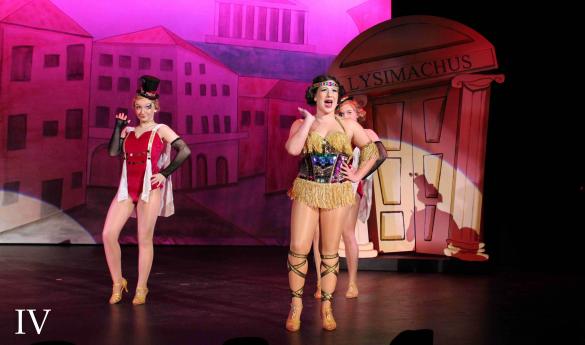Mason Players revive vaudeville in The Merchant
The Mason Players harken back to the vaudeville era with upcoming production of “The Merchant” by Titus Maccius Plautus.
Ed Gero, faculty director and adaptor of “The Merchant,” remembered this play from a previous production he did in high school.
“I knew that ‘Funny Thing Happened on the Way to the Forum’ was happening at the Shakespeare Theater, and that ‘Merchant’ is one of the plays ‘Forum’ is based on,” Gero said. “I thought it would be an interesting pairing to have what’s happening professionally in Washington reflected by what we’re doing here at Mason. It would give [the students] an opportunity to engage with ancient comedy.”
However, once Gero chose the play to direct, he realized he wanted something closer to home than what the classic Roman play would provide on its own.
“I thought, ‘Well, putting it just in the Rome period might be too remote,” Gero said. “So, thinking about ‘Forum’ and the fact that people who did ‘Forum’ were great vaudevillian actors like Zero Mostel, Phil Silvers, and Jack Gilford led me to think ‘Well, they’re using vaudevillians to do this piece, so let’s see if I can make a connection.”
According to Gero, vaudeville was the “grandchild of Roman comedy” although it was also a “distinctively American art form.” It also reflects the art of Commedia dell’arte, a particular Italian style of theater which uses stock characters in order to carry out various, typically comedic plots.
“I thought it would be a fun way to engage all of those parts of comedy, but put it into an American context,” Gero said.
Once the concept was developed, the next part of the research put into this piece was finding the music. Music was an integral part of vaudevillian theater and became equally important to this production.
Gero wanted “The Merchant” to become a play with music, not a musical.
“I wanted to update this ancient piece, bring it forward into vaudeville, then find music rather than write music for it from the period. Each character has a signature number that actually forwards the story.”
The play was translated, in part, by the director himself. The challenge to not only direct but adapt the play to suit the vaudeville theme and modern audiences seems daunting, but Gero said the process was not too difficult as the musical elements came together.
“It was seamless once I found the music. I adapted the script along with the translation that I had. I went back and looked at some of the structure, found some vaudeville books of routines and jokes and it seemed really easy to do.”
The ease came, partly, from the stock characters that vaudeville and Commedia share.
The main challenge for this production was style. Modern acting practices focus on natural, realistic style. While that suits modern plays and audiences well, that method does not work for vaudeville and Commedia. dell’Arte.
“This generation of actors are being trained in black boxes and trained to do realism,” Gero said.
While this style is popular in today’s theater, it makes the physical and vocal demands of vaudeville a challenge for many of the performers that worked on this particular production.
However, the end result is a nearly seamless and authentic representation of vaudevillian theater.
“It’s absolutely presentational. They’re pandering to the audience. Its song and dance, bad jokes, glitz, and ‘let’s give them a show.’”
“The Merchant” previews with a pay-what-you-can performance on Oct. 23 at 8 p.m. at the Harris Theater on Mason’s Fairfax Campus. Performances run Oct. 24-26 and Oct. 31-Nov. 3. Times and further information can be found at http://cfa.gmu.edu/calendar/1490/.

